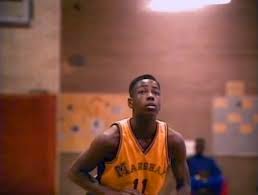Background: The documentary Hoop Dreams, directed by Steve James, follows two inner-city youth from their early teens, into their high school years, and beyond. On the surface, the film appears to be about basketball and two young men trying to become the next NBA superstar. Throughout the film, the two main characters, Arthur Agee and William Gates encounter many obstacles they must overcome in order to achieve their dreams of basketball stardom.

Main idea: Although the film appears to be about basketball, the main idea of the documentary is to show the struggle of life in the inner-city compared to in the suburbs.
Supporting Details:
- Both Arthur and William grow up in the Cabrini Green housing projects in Chicago, Illinois.
- The two boys are basketball prodigies and are recruited to play high school basketball at St. Joe's, a catholic school, in the suburbs of Chicago.
- During their freshman year at St. Joe's, Arthur struggles in basketball and does not progress as quickly as the coaches would like. William excels and is a varsity starter as a freshman.
- Arthur's father is sent to jail on drug charges. His mother loses her job and is no longer able to pay the tuition to send him to St. Joe's. Arthur ultimately has to leave St. Joe's at the end of the school year and attend public school back in Chicago.
- William is given financial aid to help pay his tuition.
- While in public school, Arthur begins to struggle academically and behaviorally.
- At St. Joe's, William has access to quality teachers and tutorial support.
- Classes in the Chicago public school are very large and teachers appear to have a lack of control over the classroom.
- William's classes at St. Joe's are small and the students are very well behaved.
- During their sophomore and junior years, Arthur continues to struggle in basketball while William excels, until a knee injury forces him to sit out the remainder of the year.
- During his junior year, despite fathering a child as teen, William still has the support of his teachers and coaches at St. Joe's.
- Arthur's father continues to go in and out of jail as well as his life.
- Arthur has to attend summer school to make up for failed classes.
- William has tutors provided to him to help increase his SAT scores, so he is eligible to play division I basketball in college.
- Despite always having the cards stacked against him, Arthur ends up excelling in basketball during his senior year and leads his team to the state championship game.
- William struggles on and off with his re-occuring knee injury his senior year, but is able to increase his SAT scores to become eligible to play division I basketball.
- Both boys go on to play basketball in college. William, who had gone to St. Joe's all 4 years, goes to Marquette on a full scholarship, while Arthur, who went to public school, goes to a smaller community college.
Works Cited
Hoop Dreams. Dir. Steve James. Karetemquin Films, 1994, Film.










